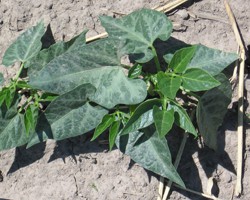2015 Lima Bean Herbicide Chart
Julie Kikkert, Team Leader, Extension Vegetable Specialist
Cornell Vegetable Program

Serious injury can be caused to lima beans if Eptam, Reflex, Assure II/Targa, or PostEmergence applications of Pursuit are used.
Herbicides that are labeled for lima beans in New York are given in the table below. Mark VanGessel from the University of Delaware provides the following information: on our loamy soils (approx. 1% organic matter) growers use 1.0 to 1.25 pints/A of Dual Magnum (rates similar for snap beans) and 1.5 to 2.0 oz of Pursuit at planting. They can be used pre-plant incorporated (PPI), but most farmers are applying them immediately after planting (PRE). Sandea is also labeled, but Pursuit is a better fit for the weeds in DE. Basagran, Sandea, Poast and Select Max are labeled for post-emergence control, with the choice depending on the weeds that emerge. We have a lot of Pursuit/Sandea resistant pigweeds in DE so be sure to rotate away from this mode of herbicide action in years that you are not growing lima beans in these fields.
Herbicides for Lima Bean Weed Control in NY in 2015 (pdf; 112KB)

Upcoming Events
African Eggplant Participatory Breeding Kick-Off
March 5, 2026
Join us to learn about the Cornell African Eggplant Research Project and learn how you can participate! African eggplant, also known as Bitterball, Garden Egg, Kittley and other names, is an important crop for many members of our community with heritage from regions such as sub-Saharan Africa, Southeast Asia, and Brazil. Since 2024, the Cornell African Eggplant Research Project has been collaborating with growers and community partners across New York to develop high-quality varieties adapted to the Northeast U.S. In this meeting, we will share information about growing and preparing African eggplant, highlight our research to date, and invite partners to collaborate with us in our 2026 participatory breeding and variety selection efforts.
COST: FREE! You must pre-register to receive the Zoom link.
Managing the Invasive Swede Midge Webinar
March 6, 2026
Swede midge is an invasive fly that causes serious economic losses to brassica crops. Due to its small size and hidden feeding habits, swede midge is often called an "invisible pest" and damage may be misdiagnosed. In this webinar, we will review the swede midge life cycle and crop damage symptoms, current management recommendations, new research findings, and highlights from on-farm case studies with a focus on organic management.
1.75 DEC pesticide recertification credits in categories 1a, 10, and 23.
Good Agricultural Practices (GAPs) Food Safety Training
March 10, 2026
Newark, NY
Learn about food safety on the farm! This event hosted by the Cornell Vegetable Program, Cornell Lake Ontario Fruit Team, CCE Wayne County, and the NYS Department of Agriculture, will cover good agricultural practices (GAPs) to help reduce the risk of microbial contamination on the farm, keeping food and consumers safe.


































